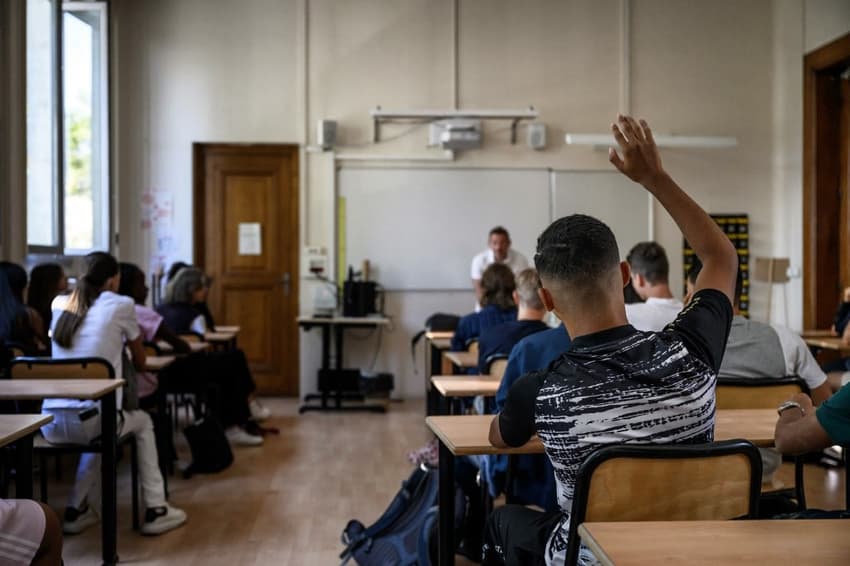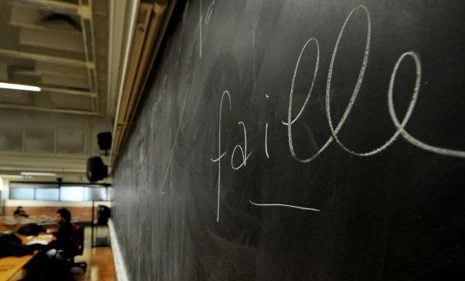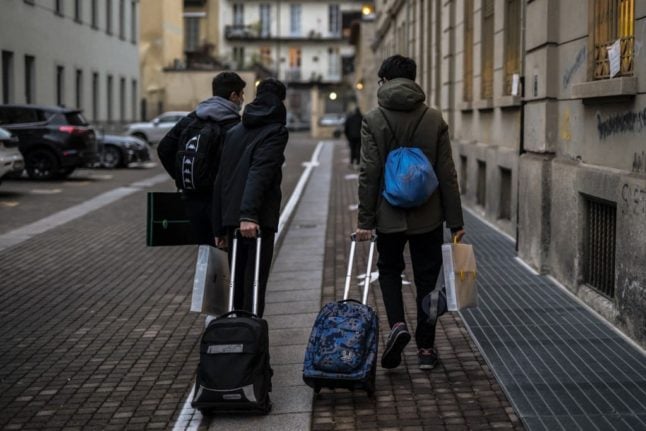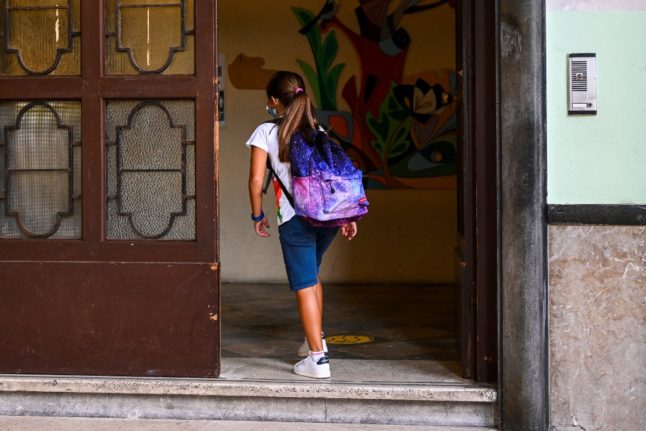'Very underfunded, very strict': What readers think of Italy's schools

After one international family blasted Italy's education system as "poor" in a an open letter, The Local asked readers to share their own experiences of Italian schools. Here's what you said.
Earlier this month Elin and Benny Mattsson, a Finnish couple that had relocated their family to Sicily, sparked a debate by publishing an open letter that amounted to a searing indictment of the Italian education system.
They said the quality of the education offered by the schools in the town of Syracuse was so poor that they had decided to end their stay just two months in and move to Spain, whose education system they rated highly.
READ ALSO: ‘Not worth it’: Why one Finnish family left Italy over ‘poor’ schools
We asked readers of The Local how the family's description of the Italian eduction system compared to their own experiences, and whether or not you thought such damning criticism was deserved.
While respondents did voice positive opinions about Italian schooling - mainly relating to the wide range of topics covered and the vast amount students are taught - on the whole, most of those who responded agreed with Mattssons that the system is in need of significant improvement.
The lack of outdoor activities and stimulation, a focus on memorising facts rather than creative and critical thinking, poor English language teaching and chronic underfunding all added up to make the system less than satisfactory for most people.
Here's what you had to say:
'The curriculum is magnificent'
Several respondents commented that students at Italian schools receive a wide-ranging, academically-rigorous education and acquire a wealth of knowledge - though many counterbalanced this with criticisms of other aspects of the system.
One respondent from the US said the liceo classico state secondary school their daughters attended in Piedmont provided "an excellent preparation for life. The curriculum is magnificent and the concept historically approved and rewarded globally."
Gabrielle Quinn, who comes from Ireland and teaches English in Italian state schools in Abruzzo, judges the Italian curriculum to be "much broader than the education my two children had in the UK".
Heidi Cameron, a Brit who lives in Pescara, Abruzzo, rated her experience with the Italian school system as "great".
The work is "a lot harder than English schools," she believes; "the subjects in Italy included philosophy and Latin and the amount of homework was incredible."
Many of those who responded mentioned the amount of homework, often describing it as excessive.
"The weekends became a nightmare because we were under pressure to get the homework done," says Faye, who comes from England and lives in Piedmont, where she says her daughter had an "awful" experience overall in elementary and middle school.
"I just still can’t understand what they did or didn’t do during the school day that warranted so much self study at home with parents," she adds.

Italian schools often compare badly with other EU countries but one international family found they couldn't accept the difference in standards. (Photo by TIZIANA FABI / AFP)
Patricia, an American who teaches English in Genoa, says she's happy with the second-grade education her son is receiving.
When she had to take him to the US for a month recently for family reasons, she says, his teachers sent daily classwork via Whatsapp, marked his work, and even sent recorded voice messages from his classmates.
"I absolutely love the dedication of my son's teachers...I am satisfied with my experience in the Italian education and I think it's miles ahead of the education he would have gotten back in the States," she says.
Paige, an American living in Piedmont, agreed that the educational material "seems ahead of the US at the same age," but noted that there are "no real options for clubs or extra-curriculars connected with the schools, which makes doing those things privately more complicated and expensive."
'Hours with no fresh air'
Another thing many respondents mentioned was a lack of outdoor time and the sedentary nature of Italian schooling, something which the Mattsons criticised heavily in their letter.
"The children stay at their desks all day. They do not get to have breaks where they can leave their desk," says Alison from England, who lives in Puglia.
"This makes it difficult to make friends as they can't play together. They also get no fresh air for up to eight hours."
READ ALSO: ‘Educational crisis’: Italy’s schools compare badly with the rest of Europe, study finds
Sally, who lives in Lucca and comes from the UK, says her children "left school with a great deal of knowledge but it was not a creative education. They were required to sit for long hours at their desks listening to their teachers."
Dawn, a Brit whose son attends school in Lazio, adds: "They have 10 minutes’ break in the morning and an hour for lunch, but often they aren’t allowed outside."
Rote learning and 'little joy'
Several readers also criticised what they saw as a rote learning style and an emphasis on academic subjects at the expense of more creative pursuits.
British national Jean Blinston, in Piedmont, says her local schools are "academically OK, but no activities outside study - sport, choir, drama group, which is what I remember from school in the UK (albeit 50 years ago!)"
"Absolutely everything is focused on academic learning with no opportunities to learn musical instruments and so on," says Dawn.
"I am happy overall with the standard of education my son is receiving, but I wish the school offered extra-curricular activities and they didn’t have to learn so many things off by heart."

International families may find Italian schools are very different to those back home - but are they really worse? (Photo by Marco Bertorello / AFP)
"The teachers were very strict with very traditional, almost Victorian teaching methods and so my once happy-go-lucky girl became shy, insular and lost all her confidence," says Faye.
"My daughter had to give up all after school activities to be able to squeeze in extra hours of study with help from a paid tutor."
"There's very little joy in the education system in Italy," said an anonymous reader from the US who lives in Milan; "it's really very much based on studying by rote."
Poor English-language teaching
Another criticism that came up repeatedly was the standard of English teaching.
Mark Pattenden, a former deputy head teacher from the UK who lives in Caserta, Campania, said he observed a "very poor level of competence in English teaching" when he visited schools in Italy.
"I am a private English teacher and so I know first hand that there are major problems with the quality of English language teaching in the schools," says Faye.
"Funding is pretty hard to come by and so they can’t afford to bring in external teachers. Many teachers are forced to teach English even though they’re not qualified to do so."
READ ALSO: Why is Italy ranked among the worst at speaking English in Europe?
"None of the English teachers that my son has had have been any good," agrees Dawn.
"I had to tell him that there is “school English” and “Mommy’s English”, and to just be patient and diplomatic during lessons at school."
Some readers believe the standard of teaching in Italy is poor in general.
Teachers in Italian schools "shout and have personal issues" which they take out on their students, says Giuseppe, who went to school in Puglia.
Cameron from the UK thinks teachers are the one "negative aspect" of Italian schooling: "the majority are at retirement age and not particularly motivated or up-to-date."
An anonymous respondent who works in the education system in Lazio called the recruitment process a "mess", adding that it "leads to hiring teachers whose credentials are fairly questionable despite having worked in schools for a long time."
READ ALSO: OPINION: Why Italians have a hard time learning English
David Garyan, an American who studied at Italian universities and has taught in Italian schools since 2019, wrote in to say he thought much of what the Mattssons' said in their letter said was, unfortunately, true.
"Teaching methodologies and materials are often not up to par," he says.
The problems with classroom discipline described in the family's letter, he suggests, "may stem, paradoxically, from the fact that it is not the students themselves who are poorly behaved, but that they are reacting to a largely obsolete system."
He describes "clearly delineated hierarchies: the teacher, never to be questioned, challenged, or engaged on equal terms, and the student, docile, meek, subservient and clearly inferior to the teacher."
An underfunded system
A majority of readers blamed underfunding for the Italian school system's defects, and several came to the teachers' defence.
"Some professors were brilliant and self motivated, taking on extra work and no compensation, but alas the system needs to be redone and time and money invested in all aspects of the Italian public education," said the anonymous US reader in Piedmont.
"It is the actual schools, buildings lack of maintenance and money as well as too few teachers who are paid too little that is the issue."
"In my son’s class, parents had to buy paint and curtains and then painted the classroom ourselves. We also raised funds and repaired a fence. I was also shocked to have to buy toilet paper and soap. The schools seem very underfunded," said Dawn in Lazio.

Italian schools: chronically underfunded? (Photo by Vincenzo PINTO / AFP)
Steven Minchington, a British national in Tuscany, says he's noticed "inconsistencies" in the schooling his daughter receives, but thinks this is "more to do with how the system works here rather than the capabilities of most teachers."
"Many seem very dedicated but seem to have frustrating jobs, with a lack of job security and resources," he adds.
Faye points out that the Italian system also means "teachers are called up to teach in schools that are miles away from their homes, and so they don’t even want to be there, and it shows."
Good schools exist
A few of the readers who got in touch said they had found very good schools - but it usually took experiencing one or two bad ones to get there.
Faye, whose daughter struggled with the Italian school system, found a school for her seven-year-old son that is "an absolutely wonderful experience. The complete opposite of what we experienced with our daughter."
"They play outside every day, they do gardening during science lessons, they go on long walks every week and every single child runs to the school gate in the morning with huge smiles on their faces."
"My son is incredibly happy, as are we."
Liam from South Africa, whose sons are now aged 11 and six, had a similar experience with state schools in Florence; they are now on their third, and finally happy.
"While full of lovely people, the first two were well below the standards my wife and I experience in South Africa and London," says Liam.
"The third school, that they both now attend is truly marvellous. We had to go on a waiting list and move into the area (Santa Croce) but it is a cut above. They are happy, learning and eager to do homework!"
Thanks to everyone who shared their opinions in our survey, including those who weren't quoted in the article.
Comments
See Also
Earlier this month Elin and Benny Mattsson, a Finnish couple that had relocated their family to Sicily, sparked a debate by publishing an open letter that amounted to a searing indictment of the Italian education system.
They said the quality of the education offered by the schools in the town of Syracuse was so poor that they had decided to end their stay just two months in and move to Spain, whose education system they rated highly.
READ ALSO: ‘Not worth it’: Why one Finnish family left Italy over ‘poor’ schools
We asked readers of The Local how the family's description of the Italian eduction system compared to their own experiences, and whether or not you thought such damning criticism was deserved.
While respondents did voice positive opinions about Italian schooling - mainly relating to the wide range of topics covered and the vast amount students are taught - on the whole, most of those who responded agreed with Mattssons that the system is in need of significant improvement.
The lack of outdoor activities and stimulation, a focus on memorising facts rather than creative and critical thinking, poor English language teaching and chronic underfunding all added up to make the system less than satisfactory for most people.
Here's what you had to say:
'The curriculum is magnificent'
Several respondents commented that students at Italian schools receive a wide-ranging, academically-rigorous education and acquire a wealth of knowledge - though many counterbalanced this with criticisms of other aspects of the system.
One respondent from the US said the liceo classico state secondary school their daughters attended in Piedmont provided "an excellent preparation for life. The curriculum is magnificent and the concept historically approved and rewarded globally."
Gabrielle Quinn, who comes from Ireland and teaches English in Italian state schools in Abruzzo, judges the Italian curriculum to be "much broader than the education my two children had in the UK".
Heidi Cameron, a Brit who lives in Pescara, Abruzzo, rated her experience with the Italian school system as "great".
The work is "a lot harder than English schools," she believes; "the subjects in Italy included philosophy and Latin and the amount of homework was incredible."
Many of those who responded mentioned the amount of homework, often describing it as excessive.
"The weekends became a nightmare because we were under pressure to get the homework done," says Faye, who comes from England and lives in Piedmont, where she says her daughter had an "awful" experience overall in elementary and middle school.
"I just still can’t understand what they did or didn’t do during the school day that warranted so much self study at home with parents," she adds.

Patricia, an American who teaches English in Genoa, says she's happy with the second-grade education her son is receiving.
When she had to take him to the US for a month recently for family reasons, she says, his teachers sent daily classwork via Whatsapp, marked his work, and even sent recorded voice messages from his classmates.
"I absolutely love the dedication of my son's teachers...I am satisfied with my experience in the Italian education and I think it's miles ahead of the education he would have gotten back in the States," she says.
Paige, an American living in Piedmont, agreed that the educational material "seems ahead of the US at the same age," but noted that there are "no real options for clubs or extra-curriculars connected with the schools, which makes doing those things privately more complicated and expensive."
'Hours with no fresh air'
Another thing many respondents mentioned was a lack of outdoor time and the sedentary nature of Italian schooling, something which the Mattsons criticised heavily in their letter.
"The children stay at their desks all day. They do not get to have breaks where they can leave their desk," says Alison from England, who lives in Puglia.
"This makes it difficult to make friends as they can't play together. They also get no fresh air for up to eight hours."
READ ALSO: ‘Educational crisis’: Italy’s schools compare badly with the rest of Europe, study finds
Sally, who lives in Lucca and comes from the UK, says her children "left school with a great deal of knowledge but it was not a creative education. They were required to sit for long hours at their desks listening to their teachers."
Dawn, a Brit whose son attends school in Lazio, adds: "They have 10 minutes’ break in the morning and an hour for lunch, but often they aren’t allowed outside."
Rote learning and 'little joy'
Several readers also criticised what they saw as a rote learning style and an emphasis on academic subjects at the expense of more creative pursuits.
British national Jean Blinston, in Piedmont, says her local schools are "academically OK, but no activities outside study - sport, choir, drama group, which is what I remember from school in the UK (albeit 50 years ago!)"
"Absolutely everything is focused on academic learning with no opportunities to learn musical instruments and so on," says Dawn.
"I am happy overall with the standard of education my son is receiving, but I wish the school offered extra-curricular activities and they didn’t have to learn so many things off by heart."

"The teachers were very strict with very traditional, almost Victorian teaching methods and so my once happy-go-lucky girl became shy, insular and lost all her confidence," says Faye.
"My daughter had to give up all after school activities to be able to squeeze in extra hours of study with help from a paid tutor."
"There's very little joy in the education system in Italy," said an anonymous reader from the US who lives in Milan; "it's really very much based on studying by rote."
Poor English-language teaching
Another criticism that came up repeatedly was the standard of English teaching.
Mark Pattenden, a former deputy head teacher from the UK who lives in Caserta, Campania, said he observed a "very poor level of competence in English teaching" when he visited schools in Italy.
"I am a private English teacher and so I know first hand that there are major problems with the quality of English language teaching in the schools," says Faye.
"Funding is pretty hard to come by and so they can’t afford to bring in external teachers. Many teachers are forced to teach English even though they’re not qualified to do so."
READ ALSO: Why is Italy ranked among the worst at speaking English in Europe?
"None of the English teachers that my son has had have been any good," agrees Dawn.
"I had to tell him that there is “school English” and “Mommy’s English”, and to just be patient and diplomatic during lessons at school."
Some readers believe the standard of teaching in Italy is poor in general.
Teachers in Italian schools "shout and have personal issues" which they take out on their students, says Giuseppe, who went to school in Puglia.
Cameron from the UK thinks teachers are the one "negative aspect" of Italian schooling: "the majority are at retirement age and not particularly motivated or up-to-date."
An anonymous respondent who works in the education system in Lazio called the recruitment process a "mess", adding that it "leads to hiring teachers whose credentials are fairly questionable despite having worked in schools for a long time."
READ ALSO: OPINION: Why Italians have a hard time learning English
David Garyan, an American who studied at Italian universities and has taught in Italian schools since 2019, wrote in to say he thought much of what the Mattssons' said in their letter said was, unfortunately, true.
"Teaching methodologies and materials are often not up to par," he says.
The problems with classroom discipline described in the family's letter, he suggests, "may stem, paradoxically, from the fact that it is not the students themselves who are poorly behaved, but that they are reacting to a largely obsolete system."
He describes "clearly delineated hierarchies: the teacher, never to be questioned, challenged, or engaged on equal terms, and the student, docile, meek, subservient and clearly inferior to the teacher."
An underfunded system
A majority of readers blamed underfunding for the Italian school system's defects, and several came to the teachers' defence.
"Some professors were brilliant and self motivated, taking on extra work and no compensation, but alas the system needs to be redone and time and money invested in all aspects of the Italian public education," said the anonymous US reader in Piedmont.
"It is the actual schools, buildings lack of maintenance and money as well as too few teachers who are paid too little that is the issue."
"In my son’s class, parents had to buy paint and curtains and then painted the classroom ourselves. We also raised funds and repaired a fence. I was also shocked to have to buy toilet paper and soap. The schools seem very underfunded," said Dawn in Lazio.

Steven Minchington, a British national in Tuscany, says he's noticed "inconsistencies" in the schooling his daughter receives, but thinks this is "more to do with how the system works here rather than the capabilities of most teachers."
"Many seem very dedicated but seem to have frustrating jobs, with a lack of job security and resources," he adds.
Faye points out that the Italian system also means "teachers are called up to teach in schools that are miles away from their homes, and so they don’t even want to be there, and it shows."
Good schools exist
A few of the readers who got in touch said they had found very good schools - but it usually took experiencing one or two bad ones to get there.
Faye, whose daughter struggled with the Italian school system, found a school for her seven-year-old son that is "an absolutely wonderful experience. The complete opposite of what we experienced with our daughter."
"They play outside every day, they do gardening during science lessons, they go on long walks every week and every single child runs to the school gate in the morning with huge smiles on their faces."
"My son is incredibly happy, as are we."
Liam from South Africa, whose sons are now aged 11 and six, had a similar experience with state schools in Florence; they are now on their third, and finally happy.
"While full of lovely people, the first two were well below the standards my wife and I experience in South Africa and London," says Liam.
"The third school, that they both now attend is truly marvellous. We had to go on a waiting list and move into the area (Santa Croce) but it is a cut above. They are happy, learning and eager to do homework!"
Thanks to everyone who shared their opinions in our survey, including those who weren't quoted in the article.
Join the conversation in our comments section below. Share your own views and experience and if you have a question or suggestion for our journalists then email us at [email protected].
Please keep comments civil, constructive and on topic – and make sure to read our terms of use before getting involved.
Please log in here to leave a comment.